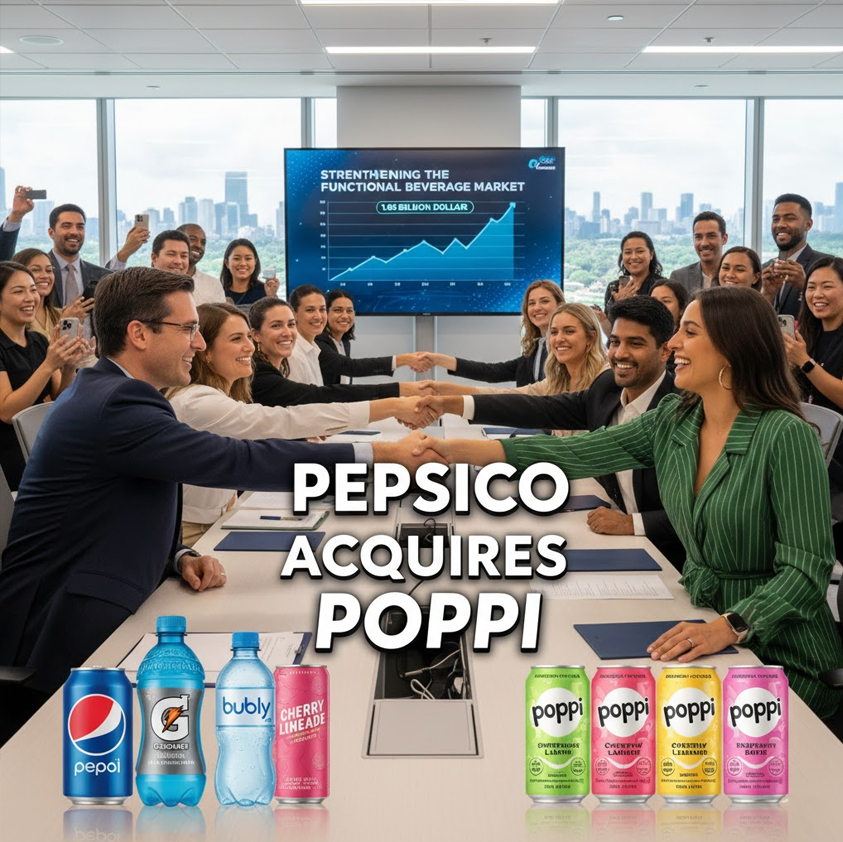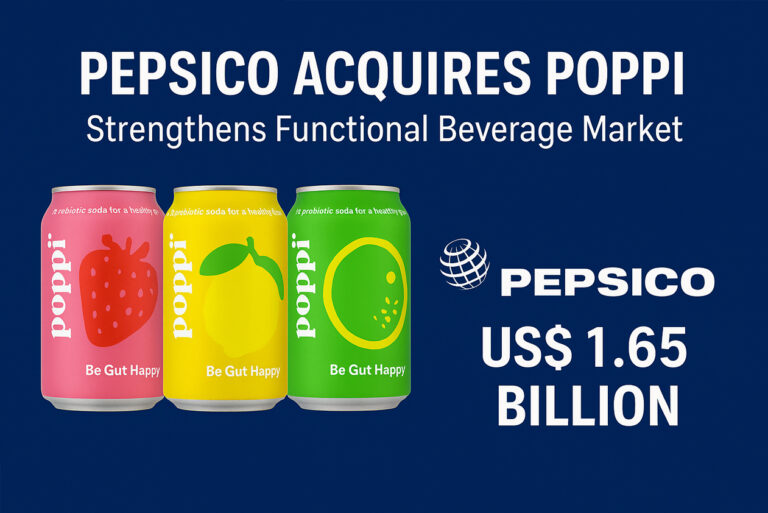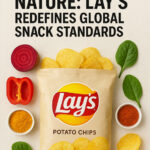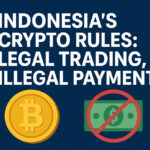Premium Biz Post – In a landmark move shaking up the beverage industry, PepsiCo acquires Poppi, strengthens functional beverage market dominance, and deepens its foothold in the fast-growing health and wellness sector. The $1.65 billion acquisition signals a strategic expansion into prebiotic and gut-health beverages — a category witnessing exponential consumer demand.

Founded in 2016 by husband-and-wife duo Allison and Stephen Ellsworth, Poppi emerged from humble beginnings in Dallas, Texas. What started as a homemade apple cider vinegar drink has evolved into one of the fastest-growing beverage startups in the United States. By combining a refreshing flavor palette with digestive health benefits, Poppi captured the attention of health-conscious consumers, particularly Millennials and Gen Z audiences seeking low-sugar, functional alternatives to traditional sodas.
A Strategic Play in the Functional Beverage Boom
PepsiCo’s decision to acquire Poppi is more than just another brand purchase — it’s a calculated response to evolving consumer behavior. The global beverage giant, already owning brands like Gatorade, Bubly, and Lifewtr, aims to balance indulgence and health within its portfolio. The inclusion of Poppi underscores a strong pivot toward products that support wellness, sustainability, and transparency.
The functional beverage market, valued at more than $180 billion in 2024, is projected to grow at a CAGR of 7.5% through 2030, according to Euromonitor. Demand for drinks offering added health benefits — from probiotics to adaptogens — continues to skyrocket, particularly as consumers shift focus toward preventive healthcare and gut health. PepsiCo’s acquisition of Poppi allows the company to tap into this momentum and compete more effectively with rising players like Olipop, Health-Ade, and GT’s Kombucha.
By the end of 2024, Poppi’s estimated revenue reached approximately $500 million, with rapid growth driven by retail expansions at major chains such as Target, Walmart, and Whole Foods. The brand’s digital-first approach and influencer-backed campaigns helped it resonate across social platforms like TikTok, where the hashtag #GutTok popularized digestive health discussions among younger demographics.
PepsiCo’s Broader Vision: Health Meets Innovation
For years, PepsiCo has been redefining its identity beyond sugary sodas and snacks. The company’s CEO, Ramon Laguarta, has emphasized “Performance with Purpose” — a strategy that integrates health, sustainability, and digital innovation across operations. With Poppi’s acquisition, PepsiCo is not only expanding its product line but also reinforcing its long-term commitment to health-focused innovation.
Poppi’s product philosophy aligns seamlessly with PepsiCo’s evolving vision. Each can of Poppi contains around 2 grams of sugar and features apple cider vinegar (ACV) as a core ingredient, known for supporting gut health and metabolism. The brand’s approach of merging natural ingredients with appealing packaging has positioned it as both functional and fashionable — a crucial blend in the modern beverage market.
The acquisition also gives PepsiCo an edge in diversifying its audience. While traditional soft drinks appeal largely to older consumers, Poppi’s branding and digital presence cater to Gen Z — a demographic driving the next wave of purchasing power. This generation prioritizes authenticity, sustainability, and health benefits, making Poppi a natural fit in PepsiCo’s portfolio.
The Rise of Prebiotic Drinks
The prebiotic beverage segment, though relatively new, is rapidly gaining traction as consumers learn about the connection between gut health and overall wellness. Unlike probiotics, which contain live bacteria, prebiotics are dietary fibers that nourish good bacteria already present in the gut. This distinction positions prebiotic sodas like Poppi as shelf-stable, convenient, and easy-to-market alternatives to fermented drinks.
According to Mintel, 65% of U.S. consumers in 2025 reported actively seeking food and drinks that improve digestive health. Prebiotic drinks have become particularly popular for their ability to combine flavor and functionality without compromising taste — a gap many early health beverages struggled to fill.
Poppi’s flavor lineup, which includes favorites like Strawberry Lemon, Cherry Limeade, and Raspberry Rose, offers both nostalgia and novelty. Its marketing slogan, “Be Gut Happy, Be Gut Healthy,” encapsulates its brand promise and reinforces the growing link between wellness and enjoyment.
Read More : ”Maintaining Children’s Health for a Better Future”
A Digital Success Story
Poppi’s success story is deeply rooted in social media. Its early rise can be traced back to a viral appearance on Shark Tank in 2018, where investor Rohan Oza (known for building brands like Vitaminwater and Bai) offered strategic funding. Following that exposure, Poppi’s founders leveraged TikTok to connect directly with younger audiences.
The brand’s strategy was simple yet effective: educational, relatable, and fun content about gut health — paired with bright, Instagram-worthy packaging. This approach led to over 1 billion views under #Poppi and #GutTok, transforming the startup into a digital-age phenomenon.
PepsiCo’s acquisition will likely enhance Poppi’s digital presence further, integrating it with PepsiCo’s global marketing ecosystem. The synergy between PepsiCo’s scale and Poppi’s online virality could set a new precedent for how legacy brands collaborate with digital-native companies.
Competitive Landscape
While PepsiCo’s acquisition strengthens its dominance, competition in the functional beverage market remains fierce. Coca-Cola has invested heavily in similar segments, acquiring BodyArmor and expanding its own kombucha and sparkling water lines. Meanwhile, startups like Olipop and Vive Organic continue to innovate rapidly, appealing to niche audiences seeking transparency and clean labels.
However, PepsiCo’s advantage lies in its global distribution and advanced supply chain capabilities. Poppi’s products, once confined to the U.S. market, could soon reach international shelves — from Southeast Asia to Europe — where the appetite for low-sugar, gut-friendly drinks is on the rise. This global reach could catapult Poppi from a trendy American soda to a worldwide health beverage leader.
The Numbers Behind the Deal
Financially, PepsiCo’s $1.65 billion purchase reflects strong confidence in Poppi’s long-term profitability. The acquisition follows a trend of major beverage companies investing in fast-growing startups to offset declining soda sales.
In 2024 alone, PepsiCo’s non-carbonated beverage portfolio accounted for over 40% of its total beverage revenue — a figure expected to increase post-acquisition. Analysts suggest that Poppi could contribute up to 5% of PepsiCo’s total beverage segment growth by 2026.
Furthermore, PepsiCo gains immediate access to Poppi’s loyal consumer base — a group known for repeat purchases and strong brand advocacy. This consumer loyalty, coupled with Poppi’s premium price point, could significantly boost PepsiCo’s margins in the functional beverage category.
Sustainability and Future Prospects
Poppi’s focus on natural ingredients and recyclable packaging complements PepsiCo’s broader sustainability goals. By 2030, PepsiCo aims to achieve net-zero emissions and ensure that all packaging is recyclable, compostable, or biodegradable. Poppi’s current production practices — emphasizing eco-friendly materials and minimal waste — make it an ideal addition to this sustainability roadmap.
Looking ahead, PepsiCo plans to maintain Poppi’s creative independence while scaling its production and distribution. Sources indicate that Poppi will continue operating under its existing leadership, allowing the brand to preserve its identity while leveraging PepsiCo’s infrastructure.
Industry experts predict that PepsiCo will expand Poppi’s product range, possibly introducing functional teas, sparkling waters, or even plant-based energy drinks. This expansion could help PepsiCo capture a larger share of the estimated $250 billion global health beverage market by 2030.
Consumer Reactions and Market Implications
Consumer reactions to the acquisition have been largely positive. Poppi fans have expressed cautious optimism, hoping PepsiCo maintains the brand’s authenticity and clean-label formula. Some industry observers note that large acquisitions sometimes dilute startup identity — but PepsiCo’s recent track record with smaller brands, such as SodaStream and Kevita, suggests a balanced approach that respects brand DNA.
For PepsiCo, the acquisition is not merely a financial move but a cultural one — an investment in the future of mindful consumption. The rise of health-driven beverages signifies a fundamental shift in how consumers define “refreshment.” It’s no longer just about taste or hydration; it’s about feeling good and doing good.
The Future of Functional Beverages
As consumers worldwide continue to prioritize health, balance, and sustainability, the beverage industry is entering a new era. Companies that innovate in function, flavor, and purpose will shape the next decade of consumption.
PepsiCo’s acquisition of Poppi sets a precedent for legacy corporations embracing innovation not through imitation but through collaboration. It reflects the growing synergy between traditional corporations and digital-first wellness startups — a model likely to define future acquisitions in the sector.
In essence, PepsiCo acquires Poppi, strengthens functional beverage market influence, and signals the beginning of a new chapter where gut health, sustainability, and innovation take center stage in global beverage trends.



